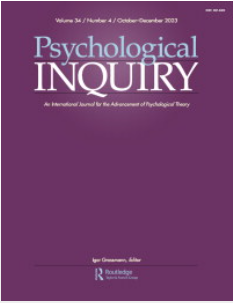意识形态作为一种道德关系语言
IF 4.1
2区 心理学
Q1 PSYCHOLOGY, MULTIDISCIPLINARY
引用次数: 1
摘要
所有群居动物必须协调保护和分配领地、资源、权利和护理。人类社会呈现出一种无处不在、无与伦比的合作水平,这种合作深入到我们的心理,它的发展使几代人积累的文化知识得以传播和利用,部分是为了确保群体在各种栖息地生存和繁荣所需的资源(Richerson&Boyd,2005)。这些过程提出了一系列关键问题,即如何在文化群体中维持直系亲属以外的互惠合作,以免被叛逃者破坏(例如,见Trivers,1971;Van Veelen、Garcıa、Rand和Nowak,2012年;Sugden,1986年;Nowak和Sigmund,2005年;Panchanathan和Boyd,2004年、2005年;Boyd和Mathew,2021年;Richerson&Boyd,2005),指出了在适应性利益的生产和分配中,执行共同的道德规范对于公平合作的重要性(参见Panchanathan&Boyd,2004;Richerson和Boyd,2005;Boyd和Mathew,2021;另见Rai&Fiske,2011,Fiske&Rai,2014)。除了历史和文化背景在设定公平方面的作用外,社会世界的复杂性给了人们相当大的道德回旋余地,让人们可以在动机、选择性、,最好地促进自己特定利益的机会主义方式(参见Batson,2008;Dana、Weber和Kuang,2007;Eftedal等人,2022;Eftedal和Thomsen,2021;Kahan,2016;Kunda,1990;Larson和Capra,2009;Regner和Matthey,2005;Slothhuus和De Vreese,2010),可能通常甚至没有意识到他们正在这样做(参见Eftedal&Thomsen,2020)。其结果是,不同的政党和联盟可能会陷入严重的意识形态冲突,而每个人都相信普遍的道德和正义支持他们特定的党派观点。鲍迈斯特和布什曼(本期)的目标是理解政治光谱双方共同的理性和道德,他们将心理学见解与进化论、文化、历史和政治研究的见解联系起来。他们认为,人类对文化的进化准备产生了两种能力和相关的偏好,一方面是关于资源的产生,另一方面是资源的分配。有人认为,这些对立的取向是由从事与资源生成和再分配相关的工作而不同地引发的,产生的意识形态团体主要关注一种社会功能而不是另一种,而社会繁荣实际上需要两者的健康结合。在这里,我们将导致社会和经济繁荣的因素(无论是在历史还是当代背景下)纳入其中,这一问题深入到历史、社会学、人类学、宏观经济学和政治学领域。相反,我们专注于对意识形态偏好中的个人和群体差异的起源进行进化协调和文化敏感的解释,对此,强有力的心理理论是相关的。这样一个账户的必要成分是什么?它会是什么样子?目标文章提出的政治党派和敌意的“文化动物”理论呼应了亚里士多德的主张,即“人本质上是一种政治动物”,社区或城邦是一个由多个部分共同发挥独特作用的机构,为更大的共同利益协同工作。在鲍迈斯特和布什曼的版本中,社会既需要生产资源的人,也需要分配资源的人。但在现代社会中,这些角色已经两极分化,政治党派的敌意随之而来。我们同意Baumeister和Bushman(以及马克思和其他许多人)的观点,即意识形态最终是建立在确保资源安全的问题上的,这些资源也是进化过程的基本货币(Sidanius和Kurzban,2013;Sidanius&Pratto,1999年)。但我们怀疑,任何一个角色或选择性战略形象都会演变为只关注资源的生产,而将资源的分配问题留给其他人。任何功能现象的进化都受到其所提供的生殖益处的限制(达尔文,1859)。因此,从本质上讲,产生和确保资源从根本上与谁将享受其生殖利益的问题有关——自己、亲属、联盟、社会。事实上,合作和文化的演变取决于进化上稳定的战略如何协调资源、权利和护理的生产和分配,从而使合作者或生产者不会被叛逃者击败或削弱(Boyd&Richerson,2009;汉密尔顿,1964年;Richerson&Boyd,20052020;Trivers,1971年)。这表明本文章由计算机程序翻译,如有差异,请以英文原文为准。
Ideology as a Moral-Relational Language
All group-living animals must coordinate securing and distributing territory, resources, rights, and care. Human society presents a ubiquitous and unsurpassed level of cooperation extending deep into our psychology, which evolved to enable and exploit the transmission of generations of accumulated cultural knowledge in part in service of securing the resources necessary for groups to survive and thrive in varied habitats (Richerson & Boyd, 2005). These processes present a series of critical questions about how reciprocal cooperation beyond immediate kin may be sustained within cultural groups so as to not be undermined by defectors (see e.g., Trivers, 1971; Van Veelen, Garc ıa, Rand, & Nowak, 2012; Sugden, 1986; Nowak & Sigmund, 2005; Panchanathan & Boyd, 2004, 2005; Boyd & Mathew, 2021; Richerson & Boyd, 2005), pointing to the importance of enforcing shared moral norms for what is a fair manner of cooperating in the production and distribution of adaptive benefits (cf. Panchanathan & Boyd, 2004; Richerson & Boyd, 2005; Boyd & Mathew, 2021; see also Rai & Fiske, 2011, Fiske & Rai, 2014). Alongside the role of history and cultural context in setting what is seen as fair, the complexity of the social world gives people considerable moral wiggle room for applying and reasoning about general justice norms in motivated, selective, opportunistic ways that best further their own particular interests (cf. Batson, 2008; Dana, Weber, & Kuang, 2007; Eftedal et al., 2022; Eftedal & Thomsen, 2021; Kahan, 2016; Kunda, 1990; Larson & Capra, 2009; Regner & Matthey, 2005; Slothuus & De Vreese, 2010), likely often without even realizing that they are doing so (cf. Eftedal & Thomsen, 2021). The result is a situation in which different parties and coalitions may be in stark ideological conflict while everybody is nevertheless convinced that universal morals and justice support their particular partisan point of view. With the goal of understanding the shared rationality and morality underlying both sides of the political spectrum, Baumeister and Bushman (this issue) connect psychological insights to those from the study of evolution, culture, history, and politics. They argue that human’s evolved readiness for culture yields two abilities and related sets of preferences concerning the generation of resources on the one hand, and their distribution, on the other. It is suggested that these opposed orientations are differentially triggered by working in jobs that are linked with resource generation versus redistribution, yielding ideological groups primarily concerned with one societal function over another, while societal flourishing in fact demands a healthy dose of both. Here, we bracket the question of the factors that lead to social and economic flourishing (whether in historical or contemporary context), one deep within the domains of history, sociology, anthropology, macroeconomics, and political science. We instead focus on efforts toward an evolutionarily attuned and culturally sensitive account of the origins of individual and group differences in ideological preferences, for which robust psychological theorizing is pertinent. What might be the necessary ingredients of such an account, and what would it look like? The target article’s proposed ‘cultural animal’ theory of political partisanship and hostility echoes Aristotle’s claim that “man is, by nature, a political animal” and that the community or polis is a body which has many parts playing their own unique role working in tandem for the greater common good. In Baumeister & Bushman’s version, society needs both people who produce resources and people who distribute them, but in modern society these roles have been polarized so that political partisan hostility follows. We agree with Baumeister & Bushman (and Marx and many others) that ideology is ultimately grounded in the very issues of securing resources that also form a basic currency of evolutionary processes (Sidanius & Kurzban, 2013; Sidanius & Pratto, 1999). But we doubt that any one role or selective strategy profile would evolve to focus solely on the production of resources, leaving issues of their distribution to others. The evolution of any functional phenomenon is constrained by the reproductive benefits which it offers (Darwin, 1859). Hence, by nature, generating and securing resources is fundamentally linked to the question of who will enjoy their reproductive benefits—oneself, one’s kin, one’s coalition, one’s society. Indeed, the evolution of cooperation and culture hinge upon the very questions of how evolutionarily stable strategies might coordinate the production and distribution of resources, rights and care so that cooperators, or producers, are not outcompeted or undermined by defectors (Boyd & Richerson, 2009; Hamilton, 1964; Richerson & Boyd, 2005, 2020; Trivers, 1971). This suggests that a psychology and ideology for
求助全文
通过发布文献求助,成功后即可免费获取论文全文。
去求助
来源期刊

Psychological Inquiry
PSYCHOLOGY, MULTIDISCIPLINARY-
CiteScore
10.30
自引率
1.10%
发文量
31
期刊介绍:
Psychological Inquiry serves as an international journal dedicated to the advancement of psychological theory. Each edition features an extensive target article exploring a controversial or provocative topic, accompanied by peer commentaries and a response from the target author(s). Proposals for target articles must be submitted using the Target Article Proposal Form, and only approved proposals undergo peer review by at least three reviewers. Authors are invited to submit their full articles after the proposal has received approval from the Editor.
 求助内容:
求助内容: 应助结果提醒方式:
应助结果提醒方式:


